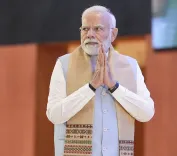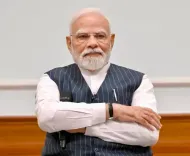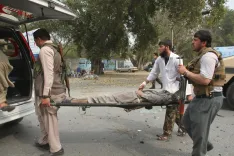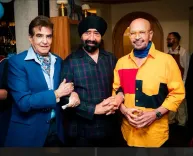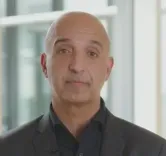Delhi Assembly Elections: Kejriwal's Brand Faces Major Challenge as BJP Aims to End 25-Year Drought
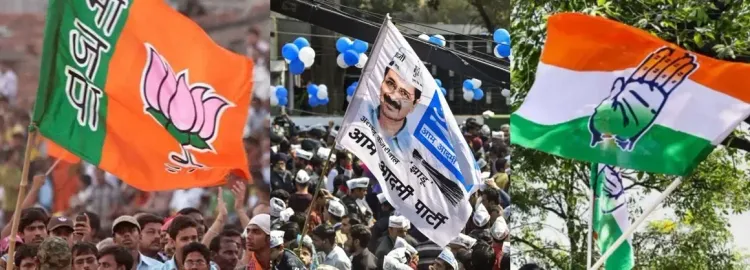
New Delhi, Dec 8 (NationPress) Brand Arvind Kejriwal is poised to encounter its most formidable challenge to date as the Aam Aadmi Party (AAP), which emerged from an anti-corruption movement led by Anna Hazare, aims to regain power in Delhi for the third time in a row.
This third effort by the AAP to seize control of the ‘Dilli Darbar’ unfolds amidst concerns of anti-incumbency, perceived underperformance from MLAs, and the party leader’s increasing reliance on defectors from other political factions.
The willingness of the youngest party in Delhi to nominate dissidents or seasoned veterans from the BJP and Congress for approximately a third of the 70 available seats indicates Kejriwal’s growing sophistication in political maneuvering and adeptness in local politics, according to political analysts.
The acceptance of nearly a dozen former MLAs from the BJP and Congress into the AAP underscores Kejriwal’s recognition that his personal appeal alone is insufficient to ensure election victories for any candidate or underperforming incumbent. This situation is a source of concern for the AAP, which appears to be proactively addressing it.
Kejriwal seems to be preparing for the most challenging fight of his political journey, advocating for vote bank politics that focus on providing free services to the most disadvantaged voters—a strategy he has mastered.
Despite the BJP’s escalating urgency to gain control in Delhi, Kejriwal shows no signs of conceding to predictions of his political demise. This resilience is evident even amidst corruption allegations against him and his cabinet members.
"There is no assurance that the corruption allegations against Kejriwal or the AAP will have the same effect on the BJP as they did for the new party that capitalized on an anti-corruption sentiment to achieve power," remarked S.K. Chahal, Dean of Social Sciences at Kurukshetra University.
Chahal pointed out that elections in Delhi are chiefly determined by the poor, slum residents, and migrants, and noted that Kejriwal has effectively maintained an offensive stance rather than retreating defensively amidst the attacks against him. In fact, he has countered these criticisms by challenging the BJP regarding the law and order situation.
"Low-income voters still account for 70-80 percent of the electorate, and the candidate who addresses their issues will prevail. Kejriwal has astutely catered to these voters’ needs through free electricity, water, and healthcare services over the last decade," Chahal stated.
The AAP continues to refine its strategy by targeting specific voter groups, including auto-rickshaw drivers advocating for fare increases, e-rickshaw drivers requiring complimentary electricity, and lawyers offered insurance coverage.
The AAP had successfully captured 62 out of 70 seats in the previous Delhi Assembly elections in 2015, with the BJP securing 8 seats and the Congress failing to win any. The elections for the upcoming 8th Delhi Legislative Assembly are anticipated around February.
BJP’s 25-Year Stalemate
The BJP has been politically sidelined in the Capital for 25 years. There is no better moment for the political chariot led by Prime Minister Narendra Modi and Home Minister Amit Shah to break this long-standing drought, especially following a series of electoral victories in the Lok Sabha and significant states such as Haryana and Maharashtra.
Over the past 30 years, the party's failures in Assembly elections have been attributed to its tendency to lose focus on larger goals while attempting to fairly represent various sub-groups or communities, including Punjabis, Jats, Vaishyas, and Poorvanchalis.
The party’s established caste-based strategy and Hindutva agenda do not yield the same success in Delhi as they do in other regions, likely due to the more informed and practical expectations of voters regarding government services, according to political analysts.
Bansuri Swaraj, the current Lok Sabha MP for New Delhi and daughter of the last BJP Chief Minister of Delhi, Sushma Swaraj, has emerged as a potential female Chief Ministerial candidate. Manoj Tiwari, the only sitting MP to contest in earlier parliamentary elections this year, is also a notable contender for the top post, according to party insiders.
Indications suggest that the forthcoming Assembly elections may present a contest between the development frameworks of the Modi government and the Kejriwal administration.
Chahal mentioned that the BJP's struggle to secure a majority in the Delhi Assembly is partially due to a leadership vacuum at the local level. "There is no 'Garibo ka Masiha' in Delhi BJP to rival Kejriwal," he observed.
Securing Fort Delhi remains daunting for the BJP, which consistently succeeds in Lok Sabha elections but falters in Assembly elections, where local issues take precedence.
BJP leaders in Delhi are optimistic that the corruption claims against Kejriwal and his cabinet, concerning the excise policy, renovations of his official residence known as 'Sheeshmahal', and scandals surrounding the cleaning of the Yamuna, will help turn the tide in their favor during the upcoming elections.
Chahal believes that while the BJP aims to address the concerns of low-income voters, the real challenge lies in convincing migrants or slum-dwelling residents that it can deliver services that rival or match those provided by the AAP.
Furthermore, the BJP has demonstrated a shift in strategy regarding welfare programs in the current Assembly elections; recent comments from the party's manifesto committee leaders indicate a commitment not only to maintaining but also enhancing free services like water, electricity, and bus travel if they regain power.
Previously, the BJP had limited its critique of Kejriwal's welfare initiatives to accusations of “poor economic strategies” and “misuse of taxpayer funds.”
The BJP is also striving to leverage discontent among specific voter groups, including unemployed bus marshals, contract hospital employees, protesting guest teachers, DTC contract workers, and auto-rickshaw drivers.
Issues surrounding 'bogus voters' and the presence of Rohingyas on the voter rolls have also been spotlighted by the BJP, which promises health insurance of up to 5 lakh under PM-JAY.
It remains uncertain whether the seven BJP MPs from Delhi and the influence of PM Modi will succeed in breaking the party’s 25-year jinx.
Congress Struggling for Revival
For the Congress, which has not secured a single seat in the Assembly since 2015, there is little to lose. Devender Yadav, the President of Delhi Congress, has already declared the party's intention to contest all 70 constituencies independently. He referred to the alliance with the AAP during the Lok Sabha elections as a miscalculation.
Yadav’s Delhi Nyay Yatra, which covered 650 km across 70 Assembly segments, has concluded, offering a glimmer of hope to its members. However, persistent issues regarding leadership and organizational structure remain.
Since the transfer of its support base among poor, Dalit, and Muslim voters to the AAP in 2015, the Congress has seen a significant decline in its influence. Its two dozen councillors in the MCD are now the only elected representatives in a city that it once governed for 15 years.
Yadav’s latest approach of challenging Kejriwal on the city’s law and order situation seems to resonate with traditional voters in rural areas.
He has questioned Kejriwal about the tangible changes the AAP has made in the city over the past decade, recalling how the AAP came to power in 2015 by criticizing the then Congress Chief Minister Sheila Dikshit for the city’s lawlessness in the wake of the Nirbhaya gang rape case.
"Law and order was under the jurisdiction of the Central government in 2015 and remains so today, so what has the AAP contributed in this regard?" he recently queried, accusing the AAP leader of exploiting poor law enforcement to score political points just before the Assembly elections.
Political analysts suggest that the Congress will likely remain a marginal player in the upcoming Assembly elections, as it grapples with its leadership challenges.
However, its participation in the race may inadvertently benefit the BJP, as the competition could evolve into a triangular contest in certain areas, reminiscent of the role the BSP played two decades ago.


